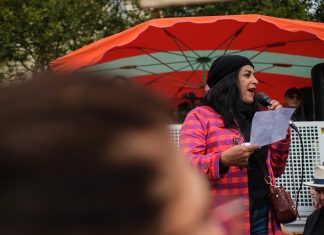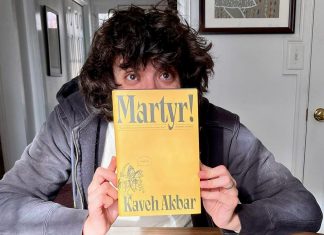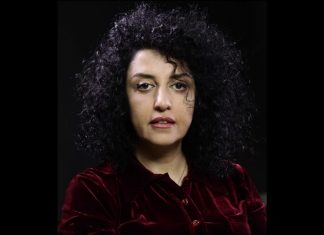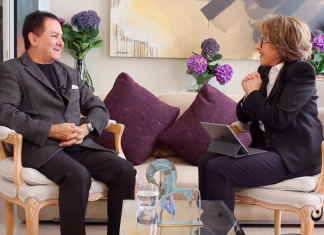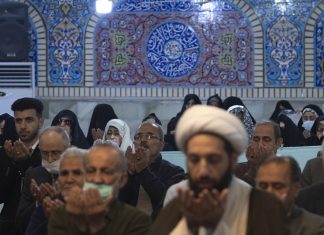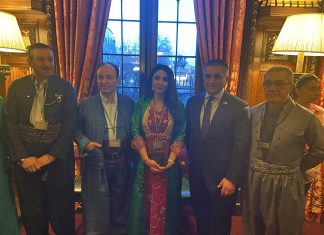By Tara Biglari
The world is a playground for jokes and laughs, at least for comedian K-von. Kevan Moezzi (his real name) draws inspiration from his Iranian roots for comedy routines that have brought him international acclaim.
Born to an American mother and Iranian father in Reno, Nevada, K-von grew up in Las Vegas. He had an all-American childhood: celebrating the Fourth of July, eating Kentucky fried chicken just like his peers. But as he got older, K-von was encouraged to talk about what made him different from everyone. The key was his heritage.
After doing odd jobs including selling massage chairs in a Las Vegas mall, K-von moved to Los Angeles at the age of 23 to pursue a career in comedy.
His style is light-hearted and he often looks to his Iranian identity as a source of humor, making fun of himself for barely speaking Persian.
K-von’s career has taken off in recent years. He has done a Ted Talk where his jokes about the Persian New Year garnered thousands of hits online, and he featured in Maz Jobrani’s 2016 film “Jimmy Vestvood: Amerikan Hero,” in addition to his live, online and television ventures.
Kayhan Life caught up with K-von for a conversation about his comedic journey, where it’s taken him, and what he plans to do in the future.
How did you first get involved with comedy?
As a little kid, I would always read a lot of comedy-related magazines and funny books, because my mom wouldn’t let me watch TV. As I got older, I started discovering TV shows like Saturday Night Live, and I said: ‘I want to do that one day when I grow up.’ Now, looking back, I’m doing exactly what I thought I was going to do as a little kid.
How long have you been practicing this as a full-time profession?
With comedy, money comes and goes. Sometimes it’s good, sometimes it’s bad, but when you first start, they pay you in chicken wings, or they’ll offer you free French fries to come to perform. It’s hard to pay bills with chicken wings, and luckily I did have a very nice job. But as I built up my comedy act, I had to decide when to give up the cushy paycheck and go all out with comedy. It took about four years. I haven’t had a regular job since, so in many ways, I retired at the age of 29, but at the same time I work a lot of hours to make sure I don’t have a real job!
What do you like about comedy, and how did you get into it?
Comedy is a way to flex every aspect of your creativity. A lot of people see us on stage and think, ‘That guy gets on stage and tells jokes.’ What they don’t see is, [what goes on] behind the scenes – writing, filming, editing, producing videos, content, funny articles, and books – so that when you show up, you have an arsenal of funny things to fall back on.
To answer the question better, I like comedy because it’s like a Rubik’s Cube. If you’re a very creative person, you’ll never fully master comedy, but you get closer and closer to it looking perfect . . . it’s always under construction.
What’s the turnout like at your shows, and is the crowd mostly Iranian?
I’m lucky in a way because I have several different shows. I have my Persian show which gets a strong audience and has gotten me a lot of fans online – it also appeals to non-Iranian Middle Eastern and Asian crowds who find similarities in our life experiences.
Then I have my college show, which goes all through America for students from all over the country, and that’s very different. Some people see me there and go: “Hey, you didn’t do any Middle Eastern jokes!” and I say “Well, we’re in Nebraska, there are no Middle Eastern people . . . ” Naturally it would make no sense to discuss the intricacies of cooking Zereshk Polow. But sometimes there’s one or two Iranians who stumble in and go “Hey, what are you doing in Iowa?!” which is very cool. Overall, the best shows are when there’s a diverse mix of people because then I can pull jokes from all over my tool belt.
How do you find YouTube/Facebook as a medium these days?
When I first started comedy, my idea was to not give away too many jokes online. This way people could be surprised in person. But as the competition increased, people would ask me if I was still doing comedy, which was really painful. So I changed my frame of mind and decided to give away one free comedy clip every week for a year and see how that worked. It quadrupled how many people follow me online, people from all over the world started tagging each other and sharing and it’s great.
I also now do short clips of unprepared things that have happened in the week. I’ll give you an example. At a show, I asked an audience member what he does for work. He looked at me and just said “Persian.” So I ran with that for a few minutes, saying “I asked what you do for work unless Persian is a job occupation now.” When I held up my camera and told that story, I got 25,000 views in a week, which I thought was a cool way to make 25,000 people laugh who wasn’t at the show, bring them in and make them feel a part of it.
What was it like working with Maz Jobrani?
Maz is such a great example and entertainer for the community. Everything about him is just friendly and upbeat, he’s really an ambassador to the culture as well as comedy. I was lucky enough that he picked me to open for him on 75 stops of his comedy tour when he just started becoming world-famous. Those were some of the best three years because it introduced me to how to handle the lifestyle. There are two options: smoke cigarettes and get drunk every night and barely make it to the show type of comedian, and then there’s the long-term, stable comedian and that’s the type of comedian Maz is. That’s how he’s been able to stay relevant for over a decade and still healthy and happy. It’s great to watch him because you learn to handle yourself on stage and off.
Have you ever been really nervous, or goofed on stage?
The first time you ever get on stage, that’s nervous, the first big show at a comedy club is a little nervous, but then you get the hang of that, and then the first time on TV you’re a little nervous, so everything is that first time. The more you do it, the more comfortable you are. Only bigger, newer opportunities really get me nervous, everything else is like “this is my job, let’s do this.” It would be like a heart surgeon getting nervous for heart surgery – even though you and I would be nervous, it’s their profession.
At least if you goof on stage, you can joke about it and make fun of what you’re making fun of. Doing comedy comes with offending people – it’s very interesting because we’re not up there running for office, we’re not influencing public policy, my thoughts aren’t going to change laws so it makes me upset when people get really offended by a joke. One time, there was someone on the laptop about 40 feet [12 meters] away from me in the crowd. So I made a comment about it, and said “sir what are you typing back there?” and the person goes “I’m a girl” and I go “oh . . . it’s hard to tell from here, the lights in my eyes” and she said “it’s pretty easy to tell!” She closed her laptop and stormed off . . . it was super awkward. How do you get out of that?!
Do you have any shows or cameos planned for the future?
I’ve got a new one-hour special coming out this Christmas. You can only make so many Middle Eastern jokes, so my special will include the election, the Olympics, dating, and broader topics. I don’t want people to say “if you’re Persian, you’ll like this guy but other than that you won’t find him funny,” so it’s got tidbits that are funny for all types of people. Then I’m lining up my tour which is going all over North America, and am looking to jump the pond with Sweden, London, and Australia. I’m going to stick to my plan of putting a new video once a week online and just take it from there!

